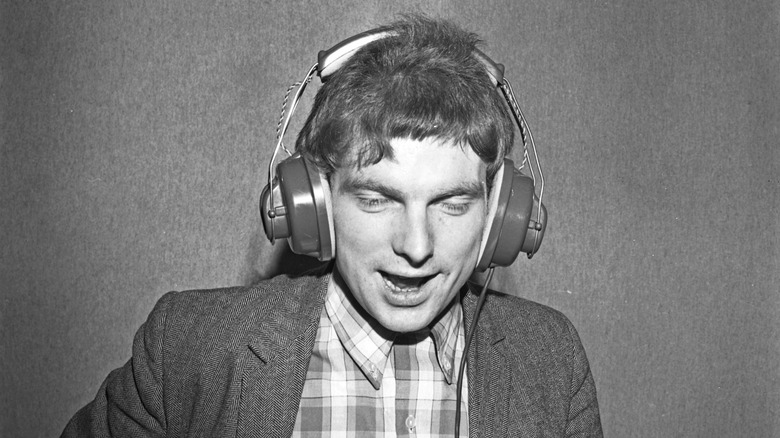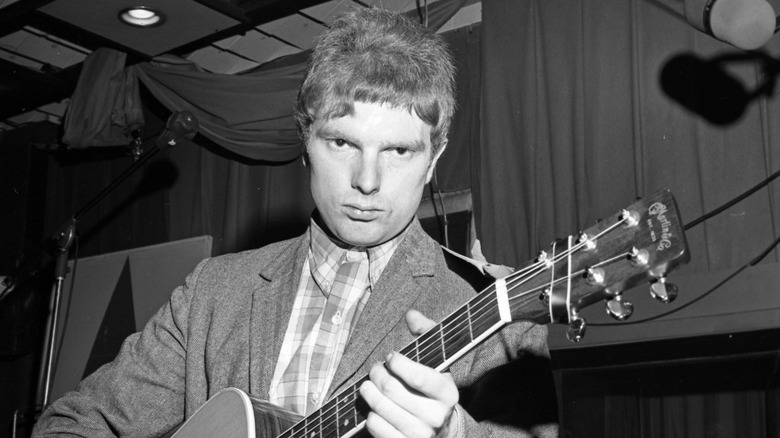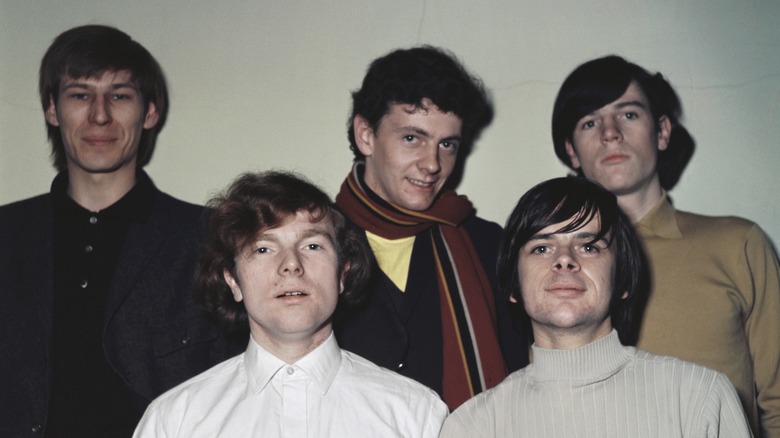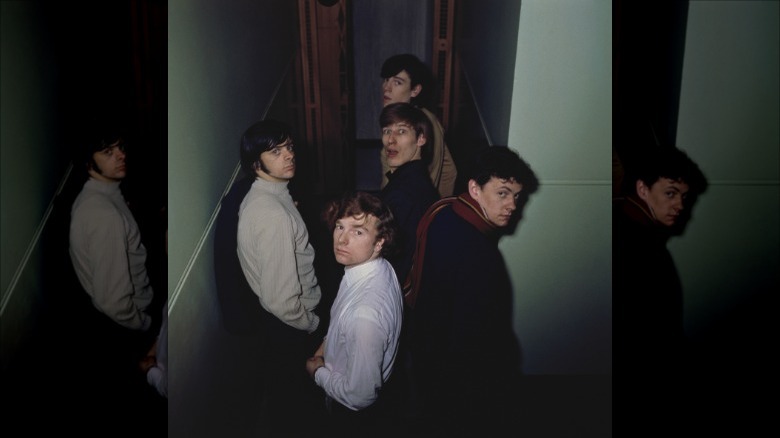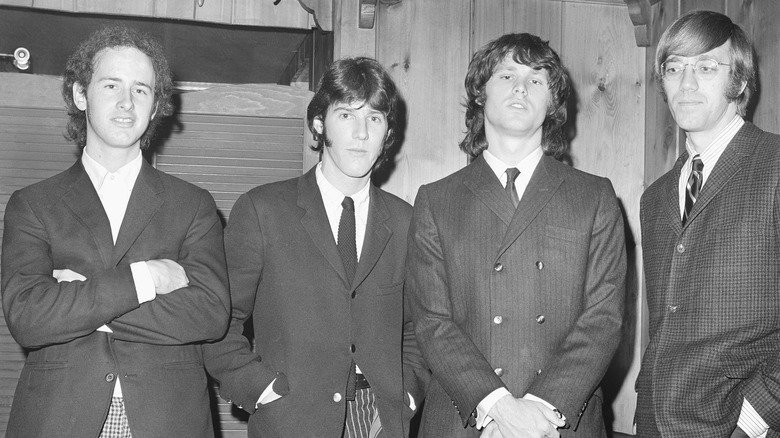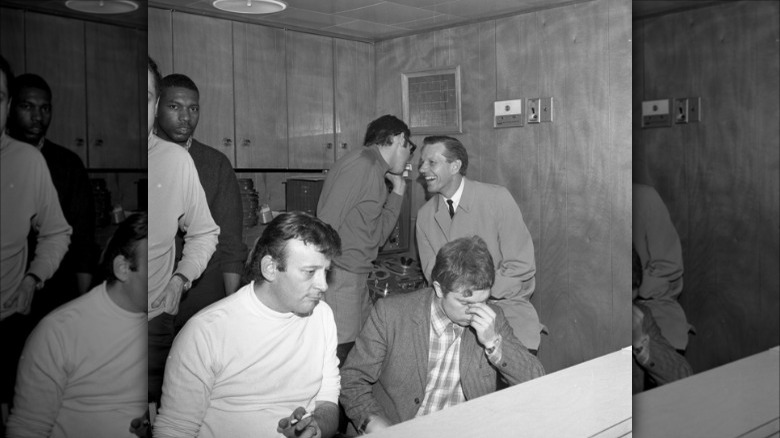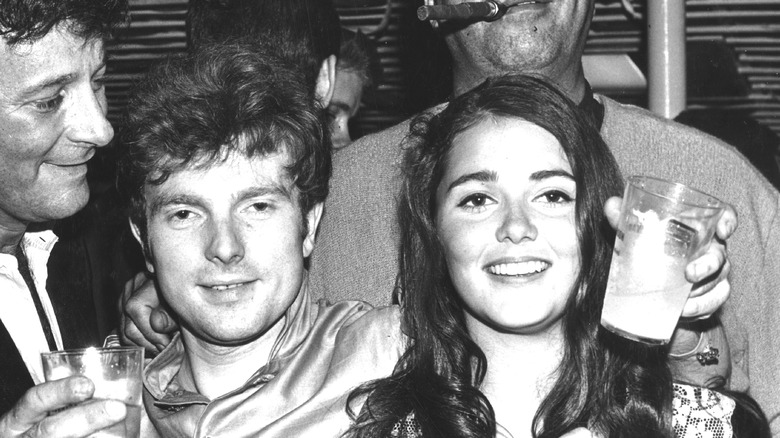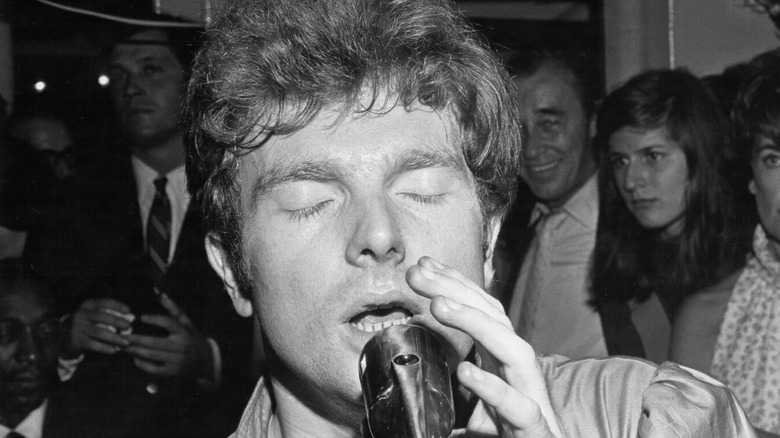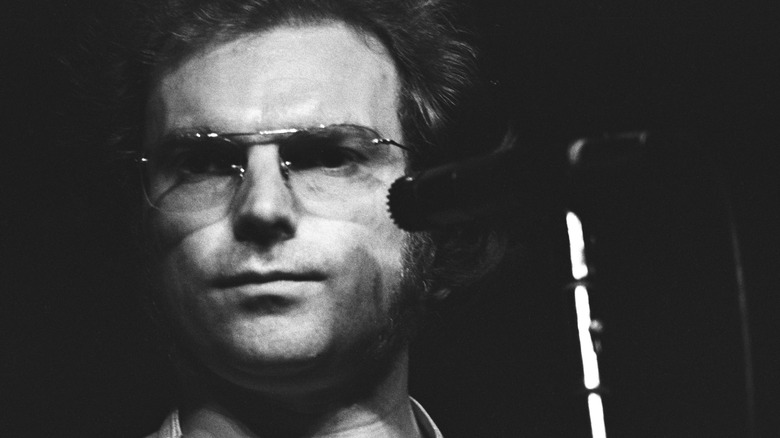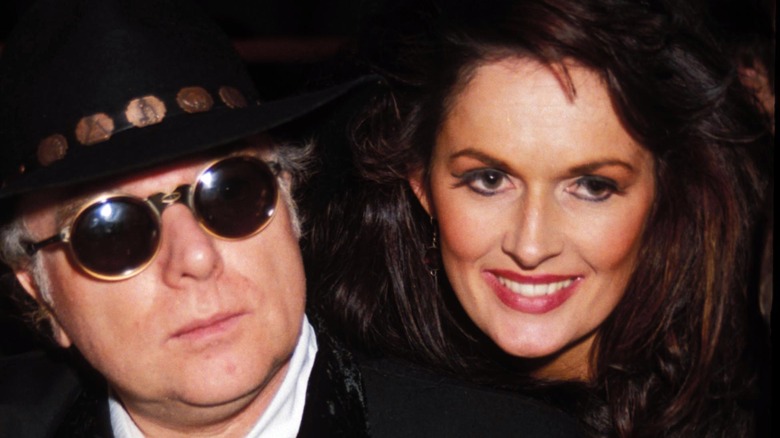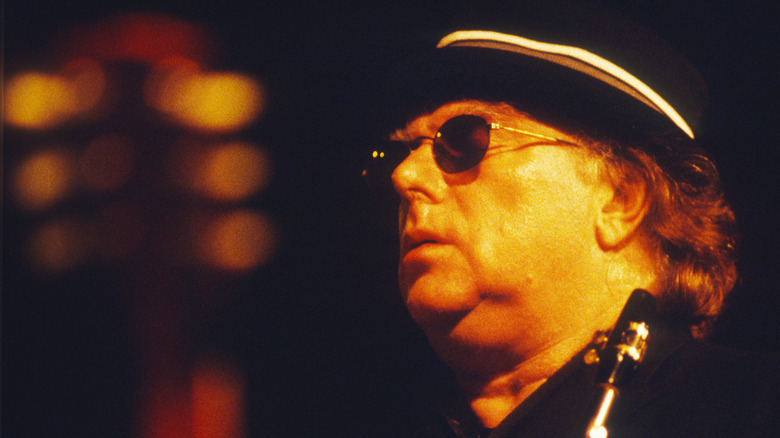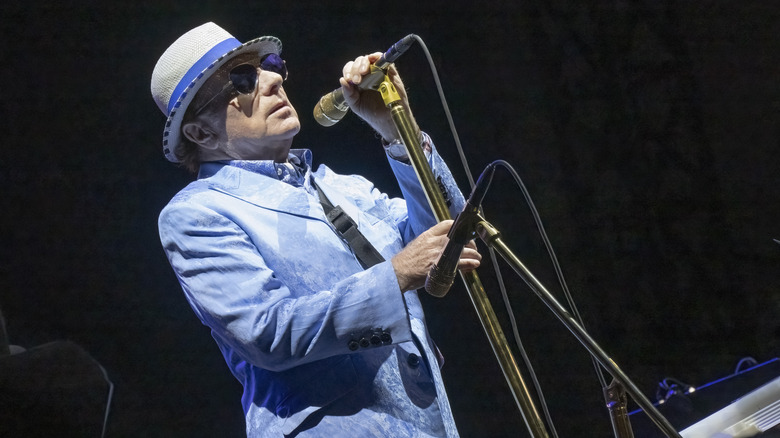Inside The Life And Career Of Van Morrison
The Northern Irish singer and songwriter Van Morrison is many things to many people. To his millions of fans, he is one of pop music's greatest and most enduring talents, a troubadour with the authenticity and poetic flair of Bob Dylan, as well as a voice as uncommonly expressive as it is technically accomplished and powerful.
To his detractors, however, Morrison is one of the industry's most notorious figures, whose difficult personality and unpredictable temperament have given him a reputation for being a menace for fellow musicians to work with. And in recent years, his crankiness seems to have infiltrated his music, meaning that, to many contemporary reviewers, Morrison's latest albums reflect the mind of an artist grown bitter and paranoid rather than grown old gracefully.
But to many others, however, he is simply a name, a musician dwarfed by the colossal success of his early classic records such as "Brown Eyed Girl," "Moondance," and "Domino." What are the true facts of Van Morrison's life and career? Here's his story.
It all started with a record collection
Numerous music critics have hailed Van Morrison as a genius over the course of a career lasting more than half a century, so it is reasonable to ask where that genius came from. Are major talents such as Morrison born with what they need to succeed? Or does it take careful nurturing on the part of supportive parents, teachers, and experts in the music industry?
As it happens, Morrison didn't come from the ideal musical background on paper. Biographer Brian Hinton, author of "Celtic Crossroads: The Art of Van Morrison," describes the future star's upbringing in Belfast, Northern Ireland, as a working-class and suburban one, spent right on the edge of the city with the countryside at his doorstep. Along with that, Belfast in the 1940s and 1950s was deeply religious, with the young Morrison exposed to Christian imagery on countless murals on the streets where he would play.
While pastoral images and religious themes would eventually become central to much of his work, and though Morrison's mother was a successful singer, the greatest influence on Morrison as a child was undoubtedly his father, George, who, after searching the United States for work, returned home with an impressive record collection, estimated to be one of the largest in Northern Ireland: "Everything from Al Jolson to 'Ave Maria,'" Morrison later claimed (via Hinton), and the boy filled his head — and imagination — with some of the greatest music money could buy.
High school dropout
Having listened attentively to the scores of top-quality records that made up his father's collection, Van Morrison quickly realized that all he really wanted to do in the world was make music himself ... and he was willing to abandon his education to follow his dream.
According to "Celtic Crossroads," Morrison started his first band, The Sputniks, at the tender age of 11, playing skiffle, a short-lived genre which was highly popular before the advent of rock and roll. But at 14, the budding musician made his first giant leap toward becoming a professional musician when he quit school to join a band called The Monarchs while working part-time as a window cleaner, says biographer Johnny Rogan in his book, "Van Morrison: No Surrender." The future star vocalist made his mark in The Monarchs with exuberant performances on sax — an instrument at which he had become adept, along with the guitar.
It was around this time that Morrison's performances also became marked by his habitual heavy drinking, as they would for the next two decades of his career, which caused tension in the band. He was eventually expelled, though, as he was already on the local music circuit, it wasn't long before he found other opportunities in a number of popular show bands.
If you or anyone you know needs help with addiction issues, help is available. Visit the Substance Abuse and Mental Health Services Administration website or contact SAMHSA's National Helpline at 1-800-662-HELP (4357).
A viral marketing masterclass
Even in the early days of his career, it was obvious that Van Morrison was the real deal when it came to musical ability and natural stagecraft. Nevertheless, it would take the future star many years of performing in various bands before he found the one with which he would make his name and become a bona fide pop star.
By the mid-'60s, Morrison was performing songs like Ray Charles' "Hit the Road Jack," with a band called The Golden Eagles, his most high-profile musical role so far. However, as Johnny Rogan describes, the new commercial success of R&B — spearheaded by bands such as The Rolling Stones, The Animals, and the Manfred Mann — had an impact on him. Like many other musicians at the time, Morrison was interested in forming an R&B band of his own, and responded to an ad in a newspaper to join a new R&B club, which would be established in Belfast's Maritime Hotel.
Per the same source, Morrison joined forces with a solid local rock and roll unit called The Gamblers, agreeing with the band to relaunch in a more positively R&B direction. Taking the name "Them" from a horror B-Movie of the previous decade, the group began to advertise their concerts in The Belfast Evening Telegraph, with cryptic messages that asked "Who are? What are? Them?" piquing the interest of locals and creating enough buzz to launch what would be Morrison's breakthrough.
Van Morrison's manager's many misgivings
Though Van Morrison and Them were beginning to turn heads with their energetic performances at Belfast's Maritime Hotel, their management felt they were facing a number of problems, not the least with regard to Morrison himself, who was now the main vocalist and front man of the group.
As Johnny Rogan explains, despite his talent there were many factors holding Morrison back from being a traditionally marketable pop or rock star. To begin with, his looks didn't fit with either the clean-cut image of many recording artists of the day, nor with the romanticized and appealing aesthetic of rock stars such as Mick Jagger, whose handsome dandyish image appealed to teenage girls at the same time they spawned thousands of imitators among the boys.
Morrison was also hugely publicity shy, unlike many of his peers, and shunned networking and social gatherings with others in the industry. Instead, stories spread about his drunkenness and difficult personality. As such, Morrison's management decided to cultivate his surly character into a saleable image, as reflected in the title of their 1965 album: "The Angry Young Them!"
A tale of two Morrisons
The rock and roll firmament of the mid-'60s was dominated by groups and artists from the British Isles, all part of the so-called "British Invasion" which saw those who followed in the footsteps of The Beatles, The Rolling Stones, and The Animals plying their trade in the United States finding huge audiences. And Van Morrison and Them were eager to get in on the action.
In 1966 and off the back of the humble success of a couple of singles released the previous year, Them traveled to the U.S. intent on making their mark. As Brian Hinton records, the band's press meetings and radio interviews were generally bad-tempered and charmless, but their reputation as energetic live performers found them a new audience across the Atlantic, with their two-month tour of the States culminating in a three-week residency at Hollywood's famous Whiskey A Go Go club.
The residency was especially notable for the presence of a band that would also go on to become iconic: The Doors, along with their lead singer Jim Morrison. The Doors front man was reportedly a huge fan of Them, and of Van Morrison in particular according to Doors drummer John Densmore. The two bands took to the stage together for a wild double-show on the final night of Them's residency, while Hinton claims that Jim Morrison learned a great deal from Van, especially in terms of the wildness of his stage performance and the air of menace he exuded.
A checkered early solo career
Though Them's time in the United States had the potential to springboard them to yet more fame and chart success on both sides of the Atlantic, things quickly went south for Van Morrison and his bandmates after a rift with their manager, Phil Solomon, which ended with a lengthy legal dispute and the group frayed and rudderless, per Johnny Rogan.
As the same source notes, Morrison returned to Belfast for a relatively quiet spell in his home city, where, with Them on the skids, he looked to build on the brand his waning band had nevertheless built for themselves. Beginning his turn toward a solo career with a new act billed as "Van Morrison & Them Again," Morrison soon attracted new management that was happy to market him under his own name.
Morrison caught the attention of Bert Berns, a producer he had first worked with as a member of Them, with whom he had recorded several sessions in New York for Bang Records, including for what would become the biggest single of his career so far, "Brown Eyed Girl." However, as Rogan notes, Bang Records' communications turned out to be lacking. Buoyed by the success of "Brown Eyed Girl," the label gathered together Morrison's recordings and released them as a disappointing album, "Blowin' Your Mind!", without his approval, leading to yet another legal dispute at the dawn of his career.
A paranoid whirlwind romance
As the mid-'60s rolled on, Van Morrison's personal life also went through dramatic changes, most notably his love life, when he fell in love with an American woman: Janet Gauder, aka Janet Planet.
Friends of the couple have given their impressions of them to biographer Johnny Rogan, describing them as an unlikely pair in many ways. Planet had previously been married, though was divorced from her husband, Peter Gauder, and with her young son was a known face on the American counterculture scene. Planet and Morrison reportedly first met during the latter's first tour of the U.S. with Them, but stayed in touch via letters, and when Morrison flew to New York to record his first solo cuts for Bang Records, Planet and her son came and joined him. Though the two married and were stable for a while, they soon faced the stress of what Planet recalled was intimidation by employees of Bang Records, and the couple was forced to flee New York for Boston (via Rogan).
Though Morrison would enjoy some of the most creative years of his career during his marriage to Planet, their time together was also plagued by increasing paranoia, with the couple in 1971 fleeing their California home by car after getting word through a psychic that the state was due to fall into the sea (via The Independent). The pair divorced in 1973.
The alchemy of Astral Weeks
Though "Brown Eyed Girl" was a glorious success in the singles chart, the legal issues that Van Morrison had with Bang Records threatened to leave his career dead in the water. However, the musician was about to hit his creative stride.
Having signed with Warner Bros., Morrison set about creating his most singular and idiosyncratic record to date: "Astral Weeks," which was released in 1968 to little fanfare, but which has since been acknowledged to be one of the greatest studio albums of all time by Rolling Stone. According to The Doors' John Densmore, Morrison would perform early versions of material for the album in private gatherings during his first U.S. tour, showing the long gestation of songs such as the title track. As reported in The New Yorker, the now-classic album was recorded in just three sessions using jazz musicians unknown to Morrison at the time. Morrison refused to interact with his band any more than was necessary; after introducing them to the songs via simple guitar chords and telling them to improvise the rest, he retreated to the vocal booth. The result, Morrison has said, was "like an alchemical kind of situation."
Percussionist Warren Smith recalled playing in the "Astral Weeks" sessions in a 2018 interview with Rolling Stone, though he claims that, at the time, they felt like any other. "Sometimes you just luck up on something that's going to be perhaps historical or recognized later on," Smith said. "You never know how those things are going to work out. But I was lucky to be there at the right time."
Overcoming writer's block
Van Morrison's career continued to bloom in the early 1970s, with his studio album "Moondance" opening him up to a more commercial audience and encouraging Morrison in his tendency toward prolificness.
However, by 1975 Morrison, now ever-present in the U.S., was starting to slump. As Johnny Rogan notes, the inclusion of public figures including musicians as targets for attack during The Troubles meant the Belfast musician was unable to revisit his homeland, and Morrison began burning out. He explained, "I just had to stop ... I'd had enough. I was mentally exhausted and I just needed to get away from music completely." Morrison's aversion to music extended to even listening to it, and he would spend days listening to silence, and reading books on spirituality and psychology. For Morrison, the break was a chance to reset his creative impulses, although the press reportedly characterized him as a recluse and a mystic.
In 1976, Morrison returned to the U.K., and finally began recording again, recruiting Dr. John as a collaborator on a comeback album, 1977's "A Period of Transition."
Van Morrison's eventful 1990s
No stranger to experimentation or following his own tastes, the late '70s and '80s saw Morrison turning his hand to a multitude of musical styles to express his lyricism, covering everything from religion and mysticism to love, life, and Morrison's personal pet peeves, to mixed critical response throughout the period (via "Celtic Crossroads").
However, the '90s saw a dramatic upturn in Morrison's critical and commercial standing ... as well as drama in his personal life. Following on the heels of a commercially successful greatest hits compilation, Morrison released "Days Like This" in 1995, an album that broke into the top five in the U.K. and, hailed as a return to form by critics, earned him a Mercury Prize nomination (via "Celtic Crossroads").
The album was notable for its cover art, featuring the new love in Morrison's life, Michelle Rocca. As described in Clinton Heylin's "Can You Feel The Silence?", the relationship between Morrison and the former Miss Ireland winner was the subject of countless column inches in his home country and abroad, especially as rumors swirled that both parties were engaged in affairs with other people even before their eventual marriage came to light.
A paternal mystery
Despite Van Morrison's public acknowledgment of both his and Michelle Rocca's affairs, the singer would eventually confirm in 2010 that the two were married, and had two daughters together (via The Independent). However, while Morrison's career was being honored by numerous awards including a knighthood (via the BBC) and a spot in the Rock & Roll Hall of Fame, his personal life continued to attract attention too.
As reported by the BBC, in 2009 a surprising message appeared on Morrison's official website, claiming that he was the father of a baby boy named George Ivan Morrison III, whom he had fathered with a Texan tour manager named Gigi Lee. Morrison denied the reports, and the message was quickly removed from the site. Nevertheless, The Independent reported that Morrison was for a time living with Lee and the child in Ireland. Tragically, the baby died owing to complications related to diabetes, while Lee died at the age of 44 of throat cancer just months later.
Morrison has never publicly commented on the reported deaths.
Raging against lockdowns
In recent decades Van Morrison has continued to ply his trade across many genres and to tour extensively, until, like the vast majority of working musicians, his career ground to a halt as a result of the COVID-19 virus in 2020. As governments around the world sought to implement lockdown restrictions to reduce the spread of the deadly virus, Morrison reacted with fury, posting now-deleted messages on his website including the following: "I call on my fellow singers, musicians, writers, producers, promoters, and others in the industry to fight with me on this. Come forward, stand up, fight the pseudo-science, and speak up" (via the Los Angeles Times).
Since then, Morrison has garnered much attention due to the conspiratorially-minded lyrics contained in recent albums such as "Latest Record Project, Volume 1," which the Los Angeles Times reports has been criticized for antisemitic overtones on songs such as "They Own the Media." Commercially successful but denounced by critics, the 2021 album was quickly followed by 2022's "What's It Gonna Take?", which, among many other gripes about the modern world, references Morrison's public feud with the Minister of Health for Northern Ireland, Robin Swann (via AnalogPlanet).

